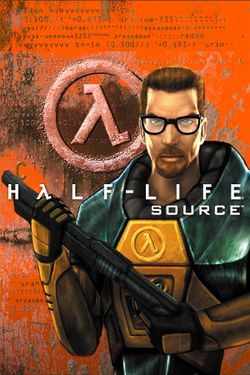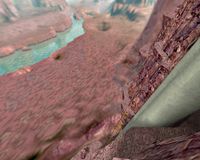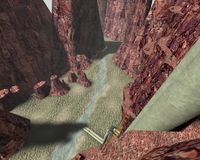Half-Life: Source
| Warning! This article has yet to be cleaned up to a higher standard of quality, per our Cleanup Project. It may contain factual errors and nonsense, as well as spelling, grammar and structure issues, or simply structure problems. Reader's discretion is advised until fixing is done. | ||
|---|---|---|
You can help clean up this page by correcting spelling and grammar, removing factual errors and rewriting sections to ensure they are clear and concise, and moving some elements when appropriate. |
This article is a stub. Maybe you can help by expanding it. |
|---|

| |
| Half-Life: Source | |
|---|---|
| Developer(s) | |
| Release date(s) |
November 16, 2004[1] |
| Genre(s) | |
| Mode(s) | |
| Platform(s) | |
| Rating(s) |
ESRB: M (Mature) |
| Distribution | |
| Input | |
| Engine | |
| Series | |
| Previous game |
N/A |
| Next game |
N/A |
Half-Life: Source is a direct port of the original Half-Life game to Half-Life 2's Source engine, introducing improved water and atmospheric effects, as well as better lighting. Generally, all of the same assets are used. It was included in the collector's edition of Half-Life 2 and is also sold separately on Steam.
Half-Life: Source became available to pre-order on October 7, 2004 as part of the Silver and Gold packages of Half-Life 2[2] and was first released as part of those editions on November 16, 2004 alongside Half-Life 2 itself.[1]
On November 17, 2023, as part of the 25th Anniversary Update for the original game, Valve unlisted Half-Life: Source from the Steam Store, encouraging players to instead play the original which they considered to be the definitive version of the title.[3]
Overview[edit]

As opposed to an actual remake of the game, it is simply a direct copy of the game's contents. Most of the original game assets were used. One example of using Half-Life 2 assets is the floor of the trash compactor at the start of Residue Processing. Most of the differences are due to the fundamental features of the new engine (more detailed lighting and water effects, for example). Some additional optimizations have been made, however, such as increased quality textures, the replacement of drawn bitmap skies with 3D skyboxes, and the addition of new or improved atmospheric effects in some areas. The game's front-end user interface has also been overhauled to resemble that of Half-Life 2, with a chapter selection and dynamic menu backgrounds featuring scenes from the game.
The port was described by Valve as a test to see what modders would experience if they attempted to bring their Half-Life mods to the Source engine.[4] Originally just an experiment of the tools created for this porting process, they decided the results were good enough to release. They next performed this same test with a multiplayer game, leading to Counter-Strike: Source.[5]
Differences[edit]
- The canyon in the chapter Surface Tension is changed.
- Most interaction sounds such as buttons, doors, and breakable objects, are reused from Half-Life 2.
- When an NPC is killed, the bodies will turn into ragdolls instead of using the usual dying animation. These bodies can not be gibbed, they become a permanent ragdoll.
- When a player dies, the camera is no longer laying on the right side, and their currently equipped weapon will be visibly dropped. If the player dies falling from a great height the screen will fade to black. The player also can't get gibbed.
Reception[edit]
The game was not received well by fans. Many of them expected a remake, while this was just a simple port. It was shipped with many bugs and glitches intensified by a Steam-pipe update in 2013.
Gallery[edit]
Menu background map, in Anomalous Materials.
Ditto, in Blast Pit.
Ditto, in Surface Tension.
Ditto, in Xen.
References[edit]
- ↑ 1.0 1.1 An archived snapshot of the Steam homepage from November 15, 2004 shows the various editions of Half-Life 2 for sale, along with which of the bundled games were available to play at that time. Games that were unavailable, such as Half-Life: Source, were denoted with an asterisk. The asterisk was removed before November 17, indicating that it was released at the same time as Half-Life 2.
- ↑ Half-Life 2 Steam Offers Ready Now on Steampowered.com (October 7, 2004) (archived)
- ↑ Valve invites you to experience the Half-Life 25th Anniversary Update on Official Half-Life website (November 17, 2023)
- ↑ Half-Life 2 Interview on HomeLAN Fed (October 19, 2004) (archived)
- ↑ PC PowerPlay, Issue 103 (September 2004), page 16








